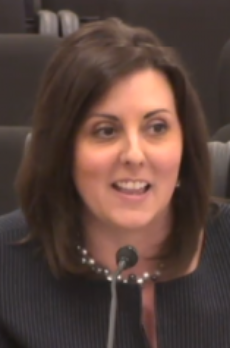

Ellen Weaver epitomizes education choice. She attended a private Christian school from kindergarten to fifth grade, was homeschooled from sixth to tenth grade, and graduated from a district high school.
Since 2013, she has worked as founding president of the nonprofit Palmetto Promise Institute to bring expanded choice to her native South Carolina.
“I’m so grateful to my parents for the incredible sacrifices they made to get me the opportunities I needed,” said Weaver, who grew up in Iowa but came home to attend college at a Bob Jones University, where she majored in political science and government. “I needed different things at different points in my education journey.”
Weaver, who describes herself as a child as “a little bookworm,” got interested in politics while riding in the car with her father, who liked to listen to conservative talk radio. She admits with a laugh to being a “Rush Baby,” a nickname that Rush Limbaugh gave to those who listened to his show as kids.
She entered college planning to major in piano performance – she had played since she was 8 – but realized she didn’t want to make a lifetime commitment. So, she opted for her other passion: politics.
Weaver spent summers working to help pay her college expenses, so she couldn’t afford to intern in Washington, D.C. But she got an opportunity to intern locally for then-U.S. Rep. Jim DeMint, a Republican who was ranked in 2011 as the 10th most conservative U.S. senator by the National Journal. DeMint also was a staunch supporter of education choice.
Right before Weaver’s graduation in 2001, an executive assistant position opened in DeMint’s Washington office. Weaver got the job and served until 2005. When DeMint was elected to the Senate, she moved with him and served as his senior adviser until she returned to South Carolina to be his state director in 2009.
When DeMint announced his resignation from the Senate after eight years to become president of the Heritage Foundation in 2013, Weaver knew she soon could be out of a job. However, she wasn’t finished with policy. A review of the state’s political landscape showed a scarcity of think tanks in South Carolina – organizations that perform research and advocacy on certain topics.
She decided the state, known for its top-down culture and lack of results in the education arena despite above-average per-pupil spending, could benefit from such efforts. ,With inspiration and seed money from DeMint and other donors, Weaver founded the Palmetto Promise Institute in 2013 to open doors for expanded education choice in South Carolina.
Weaver has been watching Florida’s success with education choice legislation and wants to replicate that in her state. She is acutely aware that in 1998, South Carolina third graders outperformed their Florida counterparts on National Association of Education Progress reading tests but have since fallen behind.
“Thanks to reforms enacted by then-Gov. Jeb Bush, in the years since, they have totally leapfrogged us,” Weaver said.
She attributes South Carolina’s lack of success in passing reforms like Florida’s as a resistance to change.
“The people at the top of the pyramid, they get along just fine,” she said. “Their kids have a good school to go to, or they have the financial capacity to make a good decision for their child. So, it’s just not on their radar.”
Weaver says even Mississippi, the state that keeps South Carolina from finishing dead last in national rankings, has realized more gains in reading than the Palmetto State in recent years.
South Carolina does offer education choice in the form of a program called Exceptional SC, which helps students with exceptional needs attend credentialed private schools through scholarships for tuition or tax credits awarded to parents or guardians for tuition expenses. The state’s charter school movement, now 25 years old, also has become more robust.
Weaver says the pandemic and the close-up look it’s afforded parents into their children’s education has created a groundswell of support for education choice. She notes this especially has been the case since the South Carolina Supreme Court struck down Gov. Henry McMaster’s attempt to use $32 million in federal COVID-19 relief to create scholarships for lower-income families to keep their children in private schools during the pandemic.
That ruling has spurred a bill for the upcoming legislative session that would offer educational savings accounts to students in low-income families. Some families have appeared in videos like this one to show how the pandemic has disrupted their children’s education and to encourage support for the education choice bill.
If state legislators approve the bill, South Carolina will join 21 other states that adopted, expanded or improved education choice programs during the era of COVID-19.
Weaver said she is optimistic that the parents’ voices will inspire lawmakers to embrace change so that all families will have access to the educational opportunities that best fit their needs.
“I think we are at a tipping point,” she said.



[…] come fast enough for children in South Carolina. As reimaginED senior writer Lisa explained in an interview with Ellen Weaver, head of the Palmetto Promise Institute, South Carolina students lag behind their peers in […]
[…] come fast enough for children in South Carolina. As reimaginED senior writer Lisa explained in an interview with Ellen Weaver, head of the Palmetto Promise Institute, South Carolina students lag behind their peers in […]
[…] fast enough for children in South Carolina. As reimaginED senior writer Lisa explained in an interview with Ellen Weaver, head of the Palmetto Promise Institute, South Carolina students lag behind their peers in […]
[…] come fast enough for children in South Carolina. As reimaginED senior writer Lisa explained in an interview with Ellen Weaver, head of the Palmetto Promise Institute, South Carolina students lag behind their peers in […]
[…] come fast enough for children in South Carolina. As reimaginED senior writer Lisa explained in an interview with Ellen Weaver, head of the Palmetto Promise Institute, South Carolina students lag behind their peers in […]
[…] come fast enough for children in South Carolina. As reimaginED senior writer Lisa explained in an interview with Ellen Weaver, head of the Palmetto Promise Institute, South Carolina students lag behind their peers in […]
[…] come fast enough for children in South Carolina. As reimaginED senior writer Lisa explained in an interview with Ellen Weaver, head of the Palmetto Promise Institute, South Carolina students lag behind their peers in […]